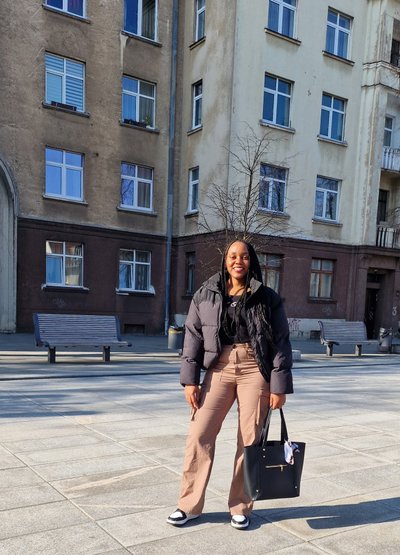An opportunity to pursue further studies changed Fallon’s plans. "The first thing that made me stay was the master’s programme. I was offered a full scholarship by KTU International Office to do a master’s, and I couldn’t pass up the opportunity," she explains.
This led to her continuing with a PhD, a decision that, while unexpected, made sense. "Following that, the PhD sort of fell into my lap too," adds Fallon.
Researching self-healing concrete
As Fallon points out, she has always been a motivated person, so the path she has chosen is not surprising. "I’d always wanted to study abroad so it never came as a shock to my family when I decided to leave," she says.
Fallon notes, that an educational experience like this is life-changing and has taught her a lot about her character: "Although both those higher study cycles have been challenging, I don’t tend to back down from challenges."
Because of Fallon’s goal-oriented character, her area of interest is also one of a kind – during her PhD studies she is working with self-healing concrete. The goal of it is to develop concrete that can seal its own cracks, improving the durability of structures and reducing maintenance costs. "The concept of self-healing concrete is becoming more necessary as sustainability in construction is more desirable," explains a KTU PhD student from Zimbabwe.

Fallon has already presented her research at two international conferences and is eager to continue this work in the upcoming year.
Furthermore, Fallon’s love for sharing knowledge extends beyond research, as she is set to teach a course in the coming semester. "I can’t say more on this as yet, but I am quite excited and pumped for a new challenge," she says, looking forward to this next step.
In Zimbabwe, life is gradually changing
Despite her ties with Lithuania, Fallon remains connected to her roots in Zimbabwe, a country in Southeast Africa. Originally from the Shona tribe, she sees how Western influences are slowly weakening some cultural traditions. "Fewer households are concerned with sticking to our traditions," she reflects, noting that many Zimbabwean families now raise their children in preparation for life outside the country.
But the one thing, according to her, remains the same – Zimbabweans are generally happy people. "Despite the hardships of the nation, life carries on and people try to find joy in the simple things," Fallon says.
Talking about Zimbabwean tribes, she explains that they are mostly tribes by name now. "You don’t find families upholding olden-day traditions. The biggest distinction of the tribes is the language. Beliefs, food, traditional dance and family structure have some similarities," Fallon adds.

Fallon did not experience culture shock upon arriving in Lithuania, as she had already navigated that challenge during her study time in Northern Cyprus. "I believe that’s where I felt the biggest differences to my country, so when I eventually got to Lithuania, being in unfamiliar territory was pretty normal," explains the young professional.
Having lived here for more than 8 years, Fallon most appreciates the security Lithuania offers: "I feel the safest in this country than anywhere else I have ever travelled to". Fallon remains open to the idea of eventually returning to Zimbabwe but admits that the timing is still uncertain. "I will eventually go home, I’m sure, but when is yet to be seen," she says with a smile.
